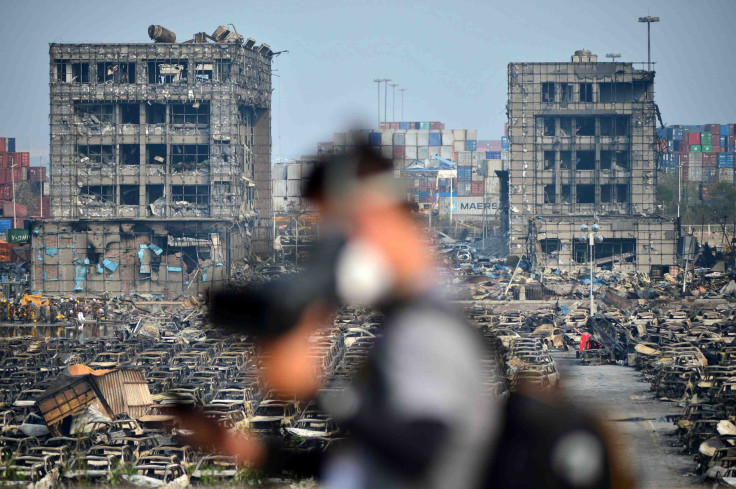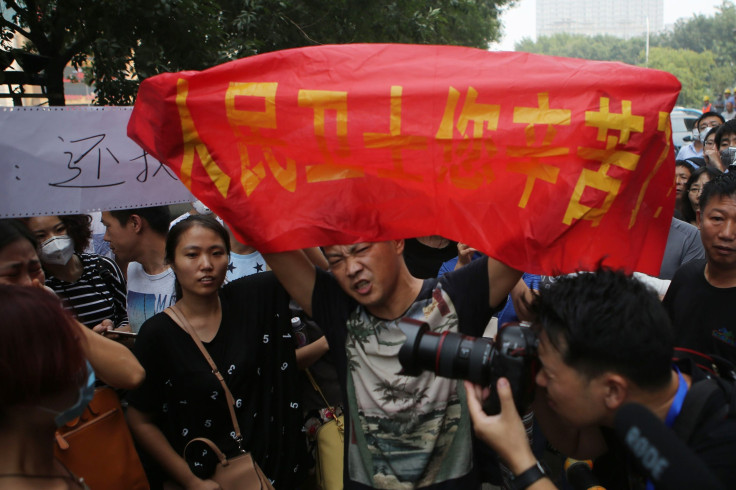Tianjin Explosions: Authorities Reveal Role Of Suspects' Political Connections In Bid To Win Back Public Confidence

Chinese state media revealed Wednesday that the owners of a chemicals warehouse that exploded last week, devastating the port city of Tianjin, had exploited political connections to circumvent safety regulations. The revelations come as part of a media push many see as a bid to curb mounting public disquiet over the official response to the explosions.
China's state-run news agency Xinhua reported that Dong Shexuan, 34, the son of a former Tianjin port police chief, and the minority shareholder in Rui Hai International Logistics, the company that owned the warehouse, had used his relationships with officials to skirt safety rules.
"My guanxi [connections] is in police and fire. When we needed a fire inspection, I went to meet with officials at the Tianjin port fire squad. I gave them the files and soon they gave me the appraisal," Dong said, according to the report.
Xinhua said its reporters interviewed Dong and the company's chief Yu Xuejun, 41, while they were in official custody, where they currently remain. The report describes the company as “dubious,” and said that some of its practices were “skewed”.
The interview came as Tianjin's mayor appeared at a press conference Wednesday, the first time he has done so since the explosions last week, to accept responsibility for the blasts.
"The accident has led to great loss of life and property. I feel very sad and guilty," he said. "As the leading official of the city, I have an unavoidable responsibility for the accident," said Mayor Huang Xingguo, who is also Tianjin's acting Communist Party secretary, the South China Morning Post reported.
In addition, on Tuesday, China's anti-graft agency announced that Yang Dongliang, a former deputy mayor of Tianjin who is currently the head of the State Administration of Work Safety, was under investigation for “suspected violations of party discipline and the law,” a common euphemism for corruption.

The parading of suspects with links to officialdom and the public mea culpa from the mayor are in stark contrast to how the government has behaved during other national disasters, where it has sought to strictly limit the flow of information that could be embarrassing to the government.
In previous crises, such as a 2008 tainted baby formula scandal in which six infants died or a 2011 high-speed train crash that left 40 dead and almost 200 injured, officials had quickly sought to shift blame away from themselves, and attempted to conceal information about what had taken place, leading to public accusations of a cover-up that damaged the ruling party's credibility.
“Like previous crises of public trust, from the SARS epidemic to the milk powder scandal, the blast has exposed many problems with the government,” Mao Shoulong, a public administration professor at Renmin University of China in Beijing told Bloomberg. “But the government has also proved a quick learner in crisis management -- in the Tianjin blast case, it’s already showing signs of adaption.”
Chinese state media this week also took the unusual step of being publicly critical of Tianjin officials. The Global Times, a state-run newspaper widely regarded as a mouthpiece for the governing Communist Party, said that Tianjin was “not an exceptional case in terms of the inadequate disaster-response,” adding: “a single slow reaction can lead to rumors running riot. And in turn, public confidence in the government will continue to fall.”
Despite the government's new approach to crisis management, some Tianjin residents have yet to be won over.
“Of course, we don’t believe the government about the air,” Tianjin resident Zhou Haisen, 23, told the New York Times. “They’re always unwilling to tell the truth. I don’t want to bet my life on their words.”
© Copyright IBTimes 2025. All rights reserved.





















